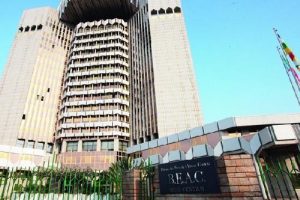Washington, DC, July 24, 2025 – The International Monetary Fund (IMF) has concluded its eighth reviews of Cameroon’s Extended Credit Facility (ECF) and Extended Fund Facility (EFF) arrangements, unlocking an immediate disbursement of approximately $75.7 million. Additionally, the IMF completed the third review under the Resilience and Sustainability Facility (RSF) arrangement, releasing $71 million to support Cameroon’s climate change initiatives. These funds bring the total disbursements under the ECF-EFF to $793.8 million and under the RSF to $162.3 million.

The authorities have successfully maintained macroeconomic stability amid domestic and external shocks. Sustaining progress in fiscal consolidation beyond the program is important to preserve debt sustainability. Key measures aim to boost non-oil revenues, improve public investment management, and strengthen domestic arrears control.
Cameroon’s economy has shown resilience, maintaining modest growth despite domestic and external challenges. However, the IMF noted that the country’s medium-term outlook, while broadly positive, faces downside risks. The government’s commitment to fiscal consolidation, non-oil revenue mobilization, and governance reforms remains critical to sustaining macroeconomic stability and ensuring debt sustainability.
Key Economic Developments
According to IMF projections, Cameroon’s GDP growth is expected to reach 3.5% in 2024, with non-oil GDP growing at 3.7%. Inflation has moderated, with consumer prices projected at 4.5% for 2024, down from recent highs. However, the oil sector continues to struggle, with oil GDP declining by 9.2% in 2024, reflecting structural challenges in the industry.
The IMF highlighted Cameroon’s high risk of debt distress, though public debt is declining and remains sustainable. The stock of public debt is projected to decrease from 42.8% of GDP in 2024 to 39.4% in 2025, with further reductions expected through 2030. To mitigate fiscal risks, the IMF emphasized the need to restructure the state-owned oil refinery, reform the electricity sector, and improve governance in other state-owned enterprises.
Fiscal and Structural Reforms
The IMF Executive Board approved waivers for Cameroon’s non-compliance with certain performance criteria, including the non-oil primary fiscal balance and net domestic financing targets for December 2024, citing corrective actions taken by the authorities. The government’s efforts to boost non-oil revenues, strengthen public investment management, and control domestic arrears were acknowledged as steps toward fiscal discipline.
Cameroon’s financial sector has also seen progress, with the recapitalization of two banks enhancing resilience. However, the IMF stressed the need to clear domestic arrears, deepen the financial market, and implement strategies to improve financial inclusion and coordination with regional institutions.
Climate and Governance Priorities
The RSF disbursement underscores Cameroon’s progress in addressing climate change risks. The funds will support efforts to strengthen the country’s climate framework, enhance resilience to environmental shocks, and attract green investments. The IMF noted that these measures are crucial for minimizing balance-of-payments impacts and fostering sustainable growth.
On governance, the IMF urged Cameroon to intensify reforms to combat corruption, strengthen anti-money laundering measures, and exit the Financial Action Task Force’s “grey” list. Reinstating full membership in the Extractive Industries Transparency Initiative and addressing public financial management weaknesses were also highlighted as priorities for promoting inclusive, private sector-led growth.
Outlook and Challenges
Looking ahead, Cameroon’s economic growth is projected to stabilize at around 4.5% by 2030, driven by non-oil sectors. However, challenges remain, including declining oil revenues, which are expected to drop to 1.4% of GDP by 2027, and persistent fiscal deficits. The current account balance, including grants, is projected to remain in deficit at 2.7% of GDP in 2025.
IMF Deputy Managing Director Nigel Clarke praised Cameroon’s efforts to maintain stability amid shocks but emphasized the need for sustained reforms. “The authorities’ commitment to fiscal consolidation, governance improvements, and climate resilience is critical for unlocking Cameroon’s growth potential,” Clarke said.
As Cameroon navigates these challenges, the IMF’s financial support and policy guidance aim to bolster the country’s economic stability and pave the way for sustainable, inclusive growth.




